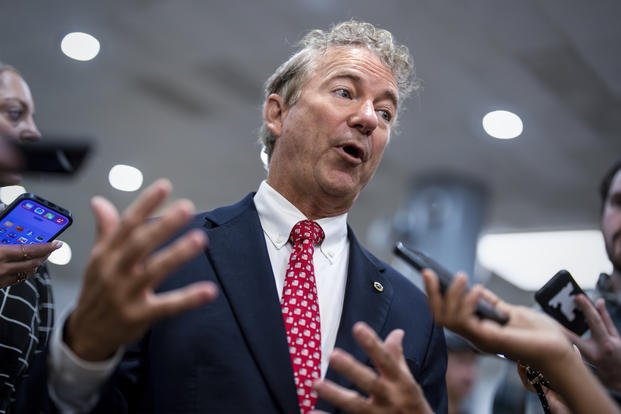A $3 billion hole in veterans benefits funding is closer to being filled, but the Friday deadline to fix the issue without potentially disrupting payments to veterans is fast approaching, with lingering questions about whether the Senate can act quickly enough.
The House on Tuesday easily approved a bill to provide the Department of Veterans Affairs with $3 billion the agency says it needs in order to ensure benefits checks due Oct. 1 can go out on time. But the Senate still needs to approve the bill, and doing so before Friday will require the consent of every senator — and at least one senator is raising the possibility of objecting.
Veterans have been urging Congress to move quickly to remove any doubt that they will get their benefits on time.
Read Next: Neo-Nazi Group Led by 2 Ex-Marines Pushed and Cheered Haitian Pet-Eating Claims Gripping Ohio City
“Every day that we get closer to Sept. 20 is another 24 hours of uncertainty for thousands of veterans whose financial lives depend on this, and every member of Congress has a moral obligation to protect these crucial benefits that our nation’s veterans have earned through their service to our great nation,” Julia Mathis, national legislative director at the American Legion, said at a news conference last week.
In July, the VA informed Congress that it was short about $3 billion of what it needs for disability and education benefits for this fiscal year, which ends at the end of the month.
Officials attributed the shortfall to higher-than-expected benefits claims under the PACT Act, the sweeping law that expanded benefits for veterans exposed to toxins during their military service. GI Bill payments have also exceeded the department’s earlier projections for this year, officials have said.
The VA gave Congress a Sept. 20 deadline to cover the shortfall, warning that benefits payments that are supposed to be sent Oct. 1 could be delayed if the funding isn’t approved by then. The department chose that date because that is when it is supposed to send the Treasury Department a list of payments that need to go out at the end of the month, VA officials told House lawmakers in a hearing last week.
While Republicans bristled at what they characterized as VA “mismanagement” contributing to the shortfall, they also said they wouldn’t punish veterans over their anger at department leadership. The bill was approved by voice vote in the House, meaning any opposition was negligible.
In addition to providing funding to cover the shortfall, the bill would require the VA to submit a report to Congress “detailing corrections the department will make to improve forecasting, data quality and budget assumptions.” The VA’s inspector general would also be required to review the “circumstances surrounding and the underlying causes” of the shortfall.
“I’ve been getting half-answers from executives at VA for two months about this shortfall,” House Veterans Affairs Committee Chairman Mike Bost, R-Ill., said on the House floor Tuesday. “This legislation is a step in the right direction, and it upholds the House Republicans’ commitment to always care for men and women who have served our military.”
Senators had tried to quickly approve the funding patch before leaving town for summer recess at the end of July. But several Republicans objected to fast-tracking the legislation without first holding a hearing on the shortfall.
The Senate Veterans Affairs Committee was scheduled to hold that hearing Wednesday afternoon.
Still, it’s unclear whether the hearing will be enough for every senator to drop their objections, allowing the bill to be approved by the end of the week. Sen. Rand Paul, R-Ky., who frequently delays funding bills, would not rule out objecting to approving the VA benefits bill before Friday.
Paul is seeking an amendment that would pay for the $3 billion by cutting money elsewhere in the federal budget, he told Military.com on Tuesday. The PACT Act, he added, was “poorly designed.”
“We’re all for funding veterans benefits,” Paul said. “There were people who were around burn pits who breathed in fumes and who have lung damage and lung problems. I’m all for taking care of them, but if you treat everybody who has hypertension with government money, you don’t have enough money left for the people who actually were injured by the burn pits.”
Pressed on whether he is concerned about veterans benefits being delayed if the bill isn’t approved by Friday, Paul said he is “very much concerned about bankrupting of the United States.”
“And we will do everything possible to try to make sure any new expenditure is paid for by an expenditure somewhere else,” he said.
Sen. Jerry Moran, R-Kan., the ranking member of the Senate Veterans Affairs Committee, said talks are ongoing to address Paul’s concerns, but he also warned about the consequences of not approving the funding by Friday.
“There’s a lot of people who are harmed — people who have served our country or their family members — who are harmed if the check is not in the mail when it’s supposed to be,” Moran said.
While Friday is the deadline the VA gave Congress, officials have also suggested there is some flexibility in that date. The VA’s timeline for sending Treasury the list of payments includes a cushion to correct any mistakes before money is sent to veterans, Joshua Jacobs, the VA under secretary for benefits, said at last week’s House hearing.
“We have the ability to accelerate the timeline for direct deposit,” Jacobs said. “It does come with additional risk. The real challenge and the real length in process is those veterans and survivors with checks because that process is time consuming and, particularly for veterans and survivors in rural areas, there may be a delay of up to two weeks.”
Related: VA Warns Congress that Benefits Payments Are at Risk Due to Projected $15 Billion Budget Shortfall
Story Continues
Read the full article here

